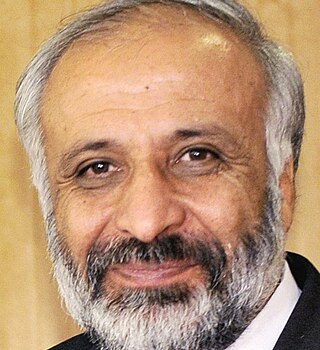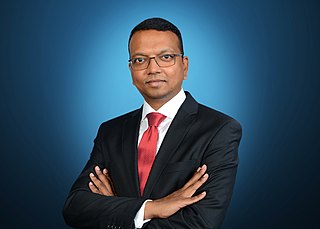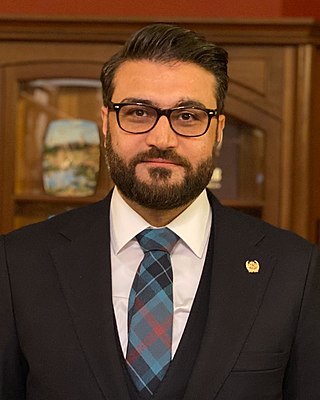Related Research Articles

The Asian Development Bank (ADB) is a regional development bank established on 19 December 1966, which is headquartered in 6 ADB Avenue, Mandaluyong, Metro Manila 1550, Philippines. The bank also maintains 31 field offices around the world to promote social and economic development in Asia. The bank admits the members of the UN Economic and Social Commission for Asia and the Pacific, and non-regional developed countries. Starting with 31 members at its establishment, ADB now has 68 members.

The government of Afghanistan is currently disputed following the effective collapse of the Islamic Republic of Afghanistan during the fall of Kabul to Taliban forces on 15 August 2021 and the subsequent re-establishment of the Islamic Emirate of Afghanistan which now exercises de facto control over most of the country. On 7 September 2021 the Taliban officials in de facto control of most of Afghanistan announced a new interim government headed by Mullah Mohammad Hassan Akhund as Prime Minister. The government is subject to the oversight of the Taliban's Supreme Leader, Haibatullah Akhundzada. As of 8 September 2021, the Islamic Emirate of Afghanistan has not yet been formally recognized as the de jure government of Afghanistan by any other country. The representatives appointed by the Islamic Republic of Afghanistan continue to represent the country at the United Nations. These representatives have refused to recognize the Taliban appointed government and have urged other countries to not recognize this government either.

The International Rescue Committee (IRC) is a global humanitarian aid, relief, and development nongovernmental organization. Founded in 1933 as the International Relief Association, at the request of Albert Einstein, and changing its name in 1942 after amalgamating with the similar Emergency Rescue Committee, the IRC provides emergency aid and long-term assistance to refugees and those displaced by war, persecution, or natural disaster. The IRC is currently working in about 40 countries and 26 U.S. cities where it resettles refugees and helps them become self-sufficient. It focuses mainly on health, education, economic wellbeing, power, and safety.

Dr. Ahmad Yusuf Nuristani is a former politician from Afghanistan. He served as governor of Herat province from January 2009 to August 2010. In September 2018, President Ashraf Ghani appointed Nuristani to the Meshrano Jirga, the upper body of parliament in Afghanistan. From 2005 to 2008 he was the 1st Deputy Defense Minister, Government of Afghanistan. He was recently convicted in the United States and in Afghanistan.

Mohammad Ashraf Ghani Ahmadzai is an Afghan former politician, academic, and economist who served as the president of Afghanistan from September 2014 until August 2021, when his government was overthrown by the Taliban.
The Afghan National Solidarity Programme (NSP) was an initiative by the government of Afghanistan which aims to rehabilitate and develop around 5 000 villages in Afghanistan. The programme has been funded by $600 million (USD) and, over three years, hopes to develop local democratically elected institutions which will identify, plan and manage for reconstruction in the locality. The project was initially, in its first year, aimed at bringing the regions determined to be in most danger up to safer standards - costing an estimated $92 million for this first year alone.

Shelton H. Davis was an American cultural anthropologist and activist for the rights of indigenous peoples. His academic and organizational work with Latin American indigenous communities contributed to the late 20th century public interest anthropology movement.

Ajmal Shams is an Afghan politician and former civil engineer.

Mohammad Haneef Atmar is a Afghan politician and former KhAD agent. He served as the Minister of interior until he was removed from the Ministry by Hamid Karzai in the wake of attacks on the June 2010 Afghan Peace Jirga. Before that he worked with several international humanitarian organisations and served as Minister of Rural Rehabilitation and Development and Minister of Education. In 2011, he was part of the Right and Justice party. During his time in office, he has visited several countries to get funding to stabilise Afghanistan.

Mohammed Masoom Stanekzai is a former Minister, Chief Peace Negotiator, and chief of the National Directorate of Security (NDS) of the Islamic Republic of Afghanistan.

Dr. Hazrat Omar Zakhilwal is an Afghan politician who served as the President's Special Representative and Afghanistan's Ambassador to Pakistan from 2016 until 2018. He also served as Minister of Finance from 2009 to 2015. Since early 2019, Zakhilwal has been a key player in the IntraAfghan Dialogue for peace.

Ranjit Nayak advocates renewable energy and cutting-edge technologies that solve global problems. He is the founder of megaOmega GmbH, a technology enterprise based in Vienna, Austria ; and of Mega Power Ltd, a green energy firm in Skopje, North Macedonia. Nayak also advises governments in Africa and the Middle East on economic and social reform.
Michael (Mihail) M. Cernea is a sociologist and anthropologist born in Romania who reestablished himself in the USA in 1974 where he has since lived. He is widely recognized for introducing sociological and anthropological approaches into the World Bank. He worked as the World Bank's Senior Adviser for Sociology and Social Policy until 1997. He has published on a wide range of the effects of development, including social change, social forestry, participation, grassroots organizations, and population resettlement. He is an author of the term "development-induced displacement and resettlement".

The World Bank is an international financial institution that provides loans and grants to the governments of low- and middle-income countries for the purpose of pursuing capital projects. The World Bank is the collective name for the International Bank for Reconstruction and Development (IBRD) and International Development Association (IDA), two of five international organizations owned by the World Bank Group. It was established along with the International Monetary Fund at the 1944 Bretton Woods Conference. After a slow start, its first loan was to France in 1947. In the 1970s, it focused on loans to developing world countries, shifting away from that mission in the 1980s. For the last 30 years, it has included NGOs and environmental groups in its loan portfolio. Its loan strategy is influenced by the United Nations' Sustainable Development Goals, as well as environmental and social safeguards.

Sayed Sadat Mansoor Naderi is an entrepreneur and politician. He was Afghanistan's State Minister of Peace from 2020 to 2021 and Minister of Urban Development and Housing from 2015 - 2018.

Hamdullah Mohib is an Afghan politician and former diplomat.

Wahidullah Waissi is a career Afghan diplomat. He is now serving as the ambassador of the Islamic Republic of Afghanistan to the Commonwealth of Australia, New Zealand and Republic of Fiji. He worked as Director-General for Economic Cooperation at the Ministry of Foreign Affairs of Islamic Republic of Afghanistan from 2012 to 2016 overseeing regional economic cooperation and multilateral development partnerships, chaired economic diplomacy committee, coordinated Regional Economic Cooperation Conference for Afghanistan process and projects and served as a Focal Point for economic Confidence Building Measures (CBMs) of the Heart of Asia Istanbul Process.
Wais Ahmad Barmak is an Afghan politician who served as the Minister of Interior. Prior to that, he served as Minister for Disaster Management and Humanitarian Affairs of Afghanistan and as Minister of Rural Rehabilitation and Development.
Mohammad Moeen Marastial is an Afghan politician who served as a Member of Parliament in Wolesi Jirga, the lower house, representing the people of Afghanistan from 2003 to 2009. During his incumbency, he advocated for education for all, a receptive and accountable government, focusing on the best interests of the nation and a strong rule of law.

Ajmal Ahmady is an Afghan-American economist and politician who formerly served as the Acting Governor of the Central Bank of Afghanistan, Da Afghanistan Bank, the Acting Minister of Commerce and Industry of Afghanistan, the Senior Economic Advisor to the President of Afghanistan, and represented Afghanistan on the Turkmenistan-Afghanistan-Pakistan-India (TAPI) natural gas pipeline.
References
- ↑ "Scott Guggenheim". Kopernik. Archived from the original on 2017-10-30. Retrieved 2017-10-29.
- ↑ "Scott Guggenheim | Innovations for Successful Societies". successfulsocieties.princeton.edu. Retrieved 2017-10-29.
- ↑ "The Man Who Thought He Could Fix Afghanistan". POLITICO Magazine. Retrieved 2017-10-29.